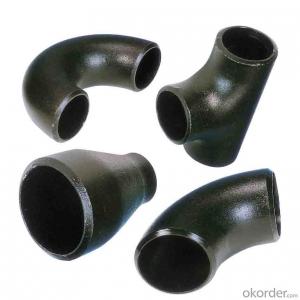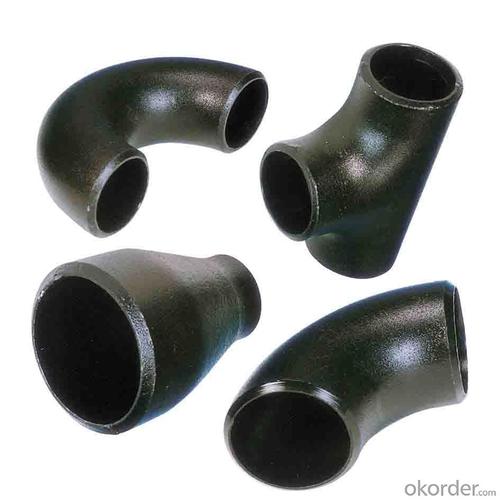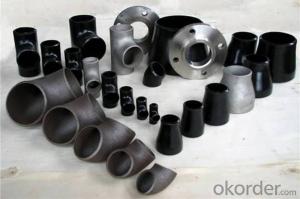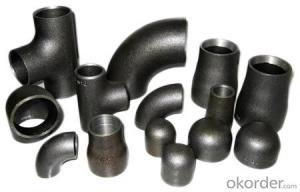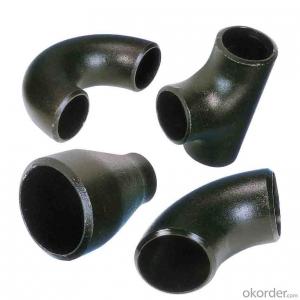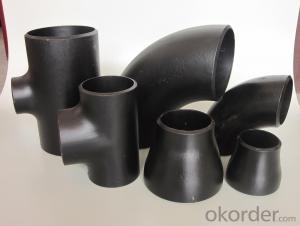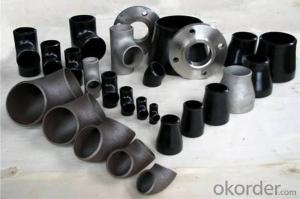26'' ELBOW TEE BEND FLANGE CARBON STEEL FITTINGS
- Loading Port:
- Tianjin
- Payment Terms:
- TT OR LC
- Min Order Qty:
- 5 m.t
- Supply Capability:
- 300 m.t/month
OKorder Service Pledge
OKorder Financial Service
You Might Also Like
Products Detailed Description
Products | pipe fittings elbows, bends,tees, reducers caps |
Size | 1/2" - 48" |
Wall thickness | Sch5-Sch160 XXS |
Standard | ANSI, ASME API5L, OCT, DIN and JIS, etc. |
we can also produce according to drawing and standards provided by customers. | |
Material | Carbon steel, alloy steel and stainless steel. |
We can produce according to materials appointed by consumers. | |
Packaging | Plywood Cases,plywood pallet, plastic bag or as customers requirement |
Surface Treatment | Shot blasted, rust-proof black oil |
Delivery Time | 10-60 days |
Quality | First grade |
Others | 1.Special design available according to your drawing. |
2.anti-corrosion and high-temperature resistant with black painting | |
3. All the production process are made under the ISO9001:2000 strictly. | |
4. A conformity rate of ex-factory inspection of products. |
Specifications
Ansi B16.9 WPB carbon steel pipe fitting elbow tee reducer
Size:Seamless 1/2"-24" Welded 1/2"-48"
ANSI B16.9 WPB carbon steel pipe fitting elbow tee reducer
1.Size: Seamless 1/2"-24" Welded 1/2"-48"
2. WT: SGP, STD, SCH40, SCH80, SCH100,SCH120,SCH160,XS,XXS
3. Material:
stainless steel Grade: 201,304,304L,316,316L,317,317L,904L,and etc
carbon steel Grade: WPB,GRB, Q235,16MN
Alloy steel: st35.8,st52,wp11,wp22,wp12 wp l6
4. Standard: ASTM/AISI/DIN/JIS
5. Type: Concentric and eccentric
6. Surface treatment: Transparent oil, rust-proof black oil
7. Applications range: Applications range: for use in the petroleum, smelting, foodstuff, power, papermaking, chemical, medical equipment,aviation, boiler heat exchanger, and other fields
8. Packing: wooden case or as per customers' requirement
- Q: What is the process of spiral steel tube production?
- X ray flaw detection: 100% X ray industrial television inspection of internal and external weld seams, and image processing system is adopted to ensure the sensitivity of flaw detection.8. press test: the steel pipe is tested by root test on the water pressure test machine to ensure the test pressure of the steel pipe to meet the standard requirement.9. chamfering flat head: the qualified steel pipe is processed at the end of the pipe to achieve the required size of the end of the pipe10. final inspection: ultrasonic and X ray inspection, and magnetic particle inspection at the end of pipe to check for welding problems and pipe end defects.11., marking: qualified steel pipe for oil, in order to prevent corrosion, and according to user requirements for marking.
- Q: What is the average lifespan of a steel pipe?
- The average lifespan of a steel pipe can vary depending on various factors such as its quality, usage conditions, maintenance, and exposure to external factors. However, on average, a properly installed and maintained steel pipe can last anywhere from 20 to 100 years or more.
- Q: What are the different methods of pressure testing steel pipes?
- There are several methods of pressure testing steel pipes, including hydrostatic testing, pneumatic testing, and ultrasonic testing.
- Q: How are steel pipes used in the agriculture industry?
- Steel pipes are used in the agriculture industry for various purposes such as irrigation systems, drainage systems, and livestock handling equipment. They provide a durable and reliable solution for transporting water, nutrients, and effluents, ensuring efficient and effective operations in farm settings.
- Q: How are steel pipes used in the manufacturing of structural frameworks?
- Steel pipes are commonly used in the manufacturing of structural frameworks due to their strength and durability. They are used as structural members to support the weight of buildings, bridges, and other infrastructure. Steel pipes are often used as columns, beams, and braces to provide stability and load-bearing capacity to the structures. The pipes are typically welded or bolted together to create a rigid framework that can withstand heavy loads and structural forces.
- Q: How are steel pipes used in nuclear power plants?
- Steel pipes are used in nuclear power plants for various purposes, including transporting coolant, steam, and other fluids, as well as providing structural support for the plant's infrastructure.
- Q: Are steel pipes suitable for high-temperature applications?
- Yes, steel pipes are suitable for high-temperature applications. Steel has excellent heat resistance properties and can withstand high temperatures without deformation or structural failure. Additionally, steel pipes can be specifically designed and coated to enhance their heat resistance, making them ideal for various industrial processes and applications involving high temperatures.
- Q: What are the common sizes of steel pipe fittings?
- The common sizes of steel pipe fittings can vary depending on the specific application and industry standards. However, there are several standard sizes that are commonly used across different industries. These sizes range from ¼ inch to 48 inches in diameter. Some of the most common sizes include ½ inch, ¾ inch, 1 inch, 1 ¼ inch, 1 ½ inch, 2 inch, 2 ½ inch, 3 inch, 4 inch, 6 inch, 8 inch, 10 inch, 12 inch, 14 inch, 16 inch, 18 inch, 20 inch, 24 inch, 30 inch, 36 inch, 42 inch, and 48 inch. These sizes are often available in various lengths to accommodate different installation requirements. It is important to consult industry standards and specifications to determine the appropriate size of steel pipe fittings for a specific project.
- Q: How are steel pipes used in the manufacturing of geothermal systems?
- Steel pipes are used in the manufacturing of geothermal systems primarily for their strength, durability, and resistance to corrosion. These pipes are used to transport fluid, typically water or a water-based solution, from the geothermal source to the surface, where it can be utilized for heating or electricity generation. The high tensile strength of steel pipes allows them to withstand the high pressure and temperature conditions typically found in geothermal systems. Additionally, steel pipes are resistant to corrosion, which is important in preventing leaks and maintaining the efficiency of the system over its lifespan.
- Q: What is the role of steel pipes in the construction of bridges?
- Steel pipes play a crucial role in the construction of bridges as they are used for various purposes such as supporting the weight of the bridge, providing structural integrity, and allowing for the flow of fluids or gases. Steel pipes are often used as support columns or piles in bridge foundations, providing stability and strength to the structure. They are also used for constructing bridge piers, trusses, and beams, ensuring the bridge can withstand heavy loads and forces. Additionally, steel pipes can be utilized for the transportation of water, gas, or other fluids across the bridge, making them essential for the overall functionality and longevity of the bridge.
Send your message to us
26'' ELBOW TEE BEND FLANGE CARBON STEEL FITTINGS
- Loading Port:
- Tianjin
- Payment Terms:
- TT OR LC
- Min Order Qty:
- 5 m.t
- Supply Capability:
- 300 m.t/month
OKorder Service Pledge
OKorder Financial Service
Similar products
Hot products
Hot Searches
Related keywords
